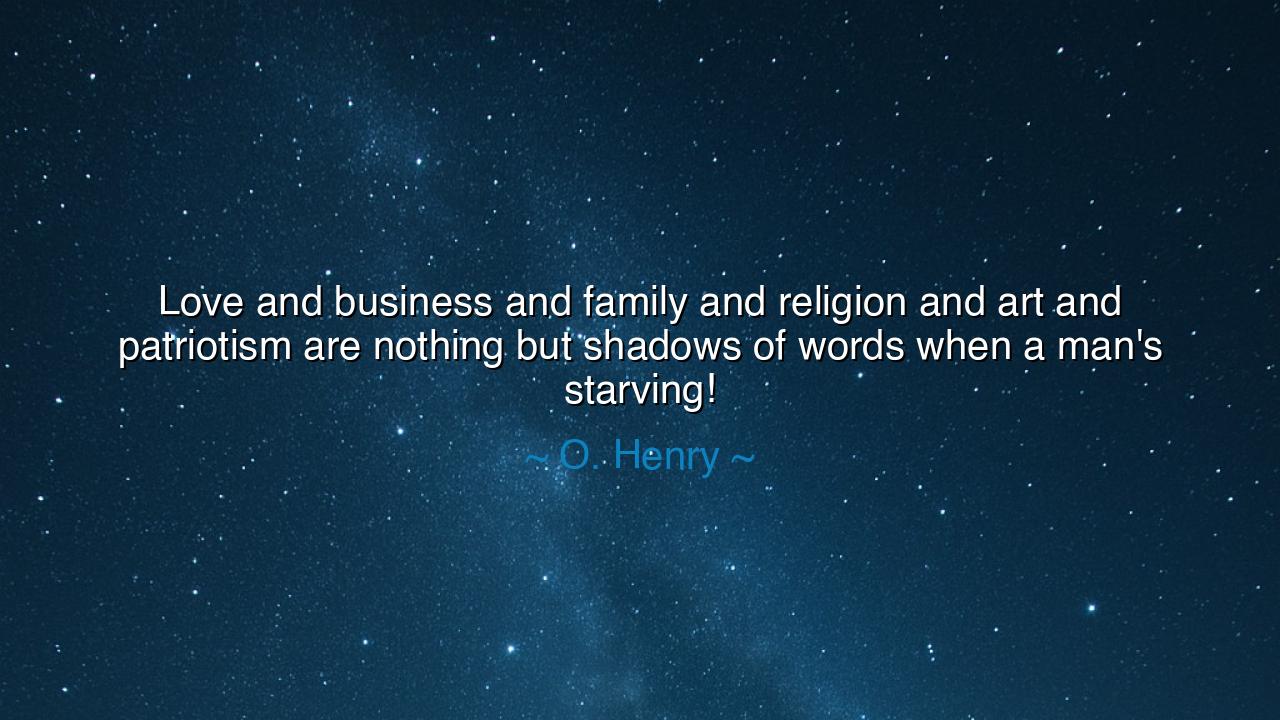
Love and business and family and religion and art and patriotism
Love and business and family and religion and art and patriotism are nothing but shadows of words when a man's starving!






“Love and business and family and religion and art and patriotism are nothing but shadows of words when a man’s starving!” Thus wrote O. Henry, the great storyteller of the common man, who knew the sting of poverty and the fragile dignity of the human soul. His words are not mere complaint—they are revelation. They uncover the terrible truth that the highest ideals of civilization—love, honor, faith, and culture—are fragile ornaments when set against the raw need for survival. When hunger gnaws at the belly, when the body weakens and the mind grows dim from want, all noble abstractions fade into distant echoes. The starving man cannot afford philosophy; his soul’s cry is simple and absolute: to live.
This truth has been written in the history of every age. Kings have preached morality while their people starved; poets have sung of beauty while hunger hollowed the faces of those who listened. O. Henry, who himself endured hardship and prison, understood this from the inside. He wrote not from judgment, but from compassion. His words expose the hypocrisy of societies that preach virtue to those who lack bread. For what use is religion to the man who cannot feed his child? What comfort is patriotism to the worker whose labor earns him only hunger? What meaning has love when the heart is too weak to beat? When survival itself is in peril, all other human pursuits become shadows of words—beautiful, yes, but powerless.
This idea echoes the wisdom of the ancients. The philosopher Epicurus once taught that no man can live nobly without first securing the necessities of life—food, shelter, and safety. Even the saints, who fasted for faith, did so by choice, not by deprivation. The hunger O. Henry speaks of is not the fasting of the pure; it is the hunger of the forgotten—the laborer, the beggar, the displaced soul who dreams of bread more than heaven. For the starving man, the first law of existence is not morality, but sustenance. And this is not sin—it is nature itself. The body, denied its due, drowns the voice of the spirit.
Consider the story of Victor Hugo’s Jean Valjean, the man who stole a loaf of bread for his sister’s starving children. For that act, he was branded a criminal, hunted by law, and condemned by society. Yet what court can condemn the man who steals to live? What sermon can reach the ears of one whose every heartbeat cries out in pain? O. Henry’s words speak for all who have been so judged—for those whose circumstances stripped them of the luxury of virtue. They remind us that hunger is not moral failure but the world’s failure, and that no civilization is righteous while its people starve.
And yet, this truth is not merely social—it is spiritual. O. Henry’s insight pierces deeper: it shows that the mind’s greatness depends upon the body’s peace. The man whose belly is empty cannot write poetry, cannot dream of art or God or justice, for he is enslaved by need. To feed the hungry, therefore, is not charity—it is liberation. Only when the basic needs of life are met can the higher virtues of man awaken. Love, art, religion—these are not for the starving, but for the nourished. Thus, before preaching beauty or morality, the wise must first learn compassion, and feed the flesh that houses the soul.
The ancients understood this harmony between body and spirit. Confucius taught that “first the people must have enough to eat; only then can they learn virtue.” A society that ignores this law invites decay from within. O. Henry’s words, then, are not only a lament but a summons—to remember that human dignity begins with bread. The poet, the priest, the statesman—all must bow before this truth, for without it, their works are built upon emptiness. To speak of love while ignoring hunger is to worship illusion; to praise art in the face of poverty is to betray the divine purpose of beauty itself.
And so, my child of conscience, let this be the lesson carved into your heart: feed before you preach, comfort before you judge, understand before you demand. For no philosophy, no faith, no art can flourish where the stomach groans and the spirit is crushed by want. If you would serve humanity, begin with the bread and water of compassion. Let your hands, not merely your words, give life to others. Then, when hunger has been silenced, love and art and faith will no longer be shadows—they will shine with the full light of truth.
Thus, in O. Henry’s bitter wisdom, we hear both warning and hope. The measure of civilization is not in its temples or its treasures, but in how it feeds its hungry. When the body is nourished, the soul remembers its wings. And only then—only when man is free from the terror of want—can love, family, religion, and art rise from shadows into the radiant fullness of meaning they were always meant to hold.






AAdministratorAdministrator
Welcome, honored guests. Please leave a comment, we will respond soon